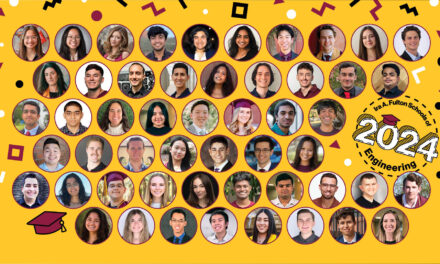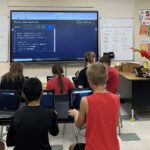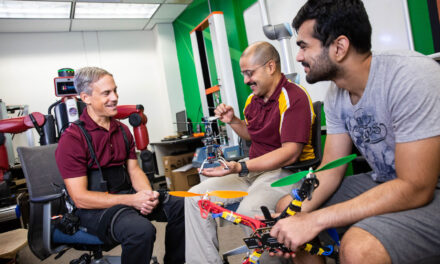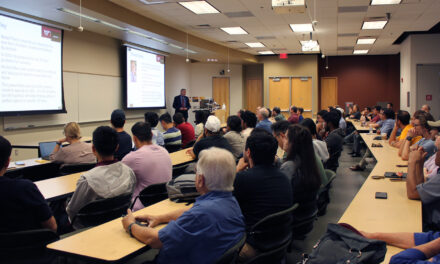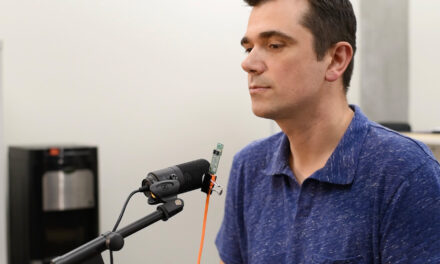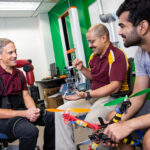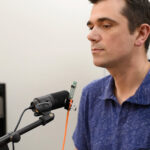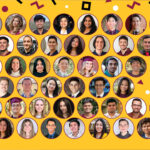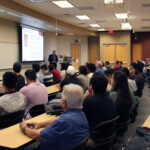
Student’s humanitarian spirit helps make global impact
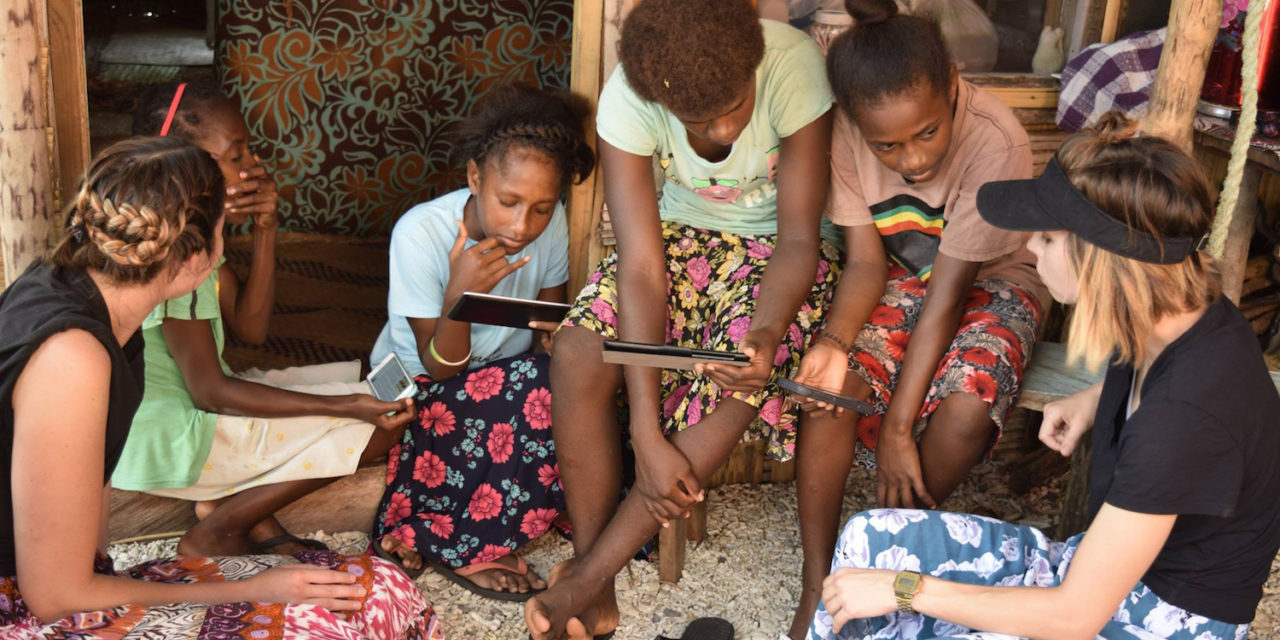
Above: On the island of Nguna, a community that lacks access to electricity, internet and running water, Brittany Blevins (far left) and Brianna Fornes (far right) show some of the local children the educational content available on the SolarSPELL. Photo courtesy of Brittany Blevins
Brittany Blevins understands the impact that engineers can make in the world.
“Engineers have a great responsibility to society,” Blevins says. “With the speed at which technology is advancing, it is a field that needs skilled people more than ever.”
It’s that sentiment that propelled her to Vanuatu as part of the SolarSPELL team led by Assistant Professor Laura Hosman.
SolarSPELL, short for Solar Powered Educational Learning Library, is a ruggedized, portable solar-powered digital library that is used over an offline WiFi hotspot that is designed to simulate an online experience. SolarSPELL teamed up with the U.S. Peace Corps in the Pacific Islands that are stationed at remote, rural schools and health care clinics for two years.
Making a difference in Vanuatu
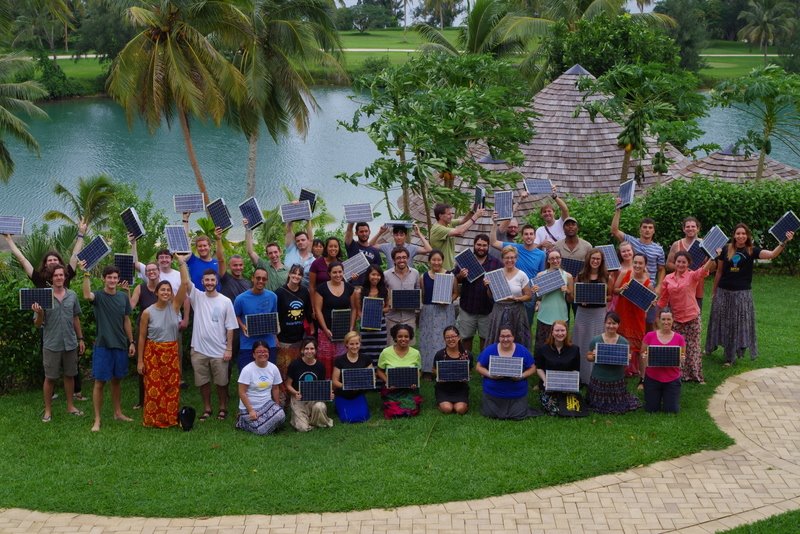
The SolarSPELL team trained incoming Peace Corps Volunteers in Vanuatu. Photo courtesy of Brittany Blevins
In Vanuatu, the team met with a group of 41 incoming Peace Corps Volunteers to train them on the libraries before they went to their new home for the next two years.
“During this meeting, we trained them on what the SolarSPELL is, how it works, why it is important, the history of the project, who it benefits, etc.,” says Blevins. “We also met with volunteers who had already been in the field for a while to gain insight on the types of technology and internet connectivity they had in their communities.”
Blevins involvement with the SolarSPELL project started during the spring 2017 semester as she took Hosman’s humanitarian engineering project course. Hosman holds a joint appointment in the School for the Future of Innovation in Society and in the Polytechnic School.
“I have traveled to developing communities for projects in the past, however I had never been anywhere that lacked access to electricity or running water,” Blevins says of Vanuatu. “Those are things that you don’t really think about living without when you’ve had it your whole life. In the engineering program, you meet students who are driven by the newest technologies and see projects that are designed with the latest advanced programs in state-of-the-art labs, so to visit a community that has minimal influence by technology is an eye-opening experience. I learn more about myself with each field experience and this trip definitely reaffirmed my passion for working in the developing world now and in the future.”
Inspiring a community
As a big fan of the SolarSPELL project, Blevins describes the project as a way to provide educational and health resources to people who have limited access to them otherwise.
“Although we take this information for granted, the wide variety and amount of content provided on the library inspires curiosity to the users we design for,” says Blevins. “From a hardware perspective, the device is designed to inspire curiosity in the STEM field. The SPELL works to create connections first between people and educational information.”
As the team continues to learn about and travel to the communities they are developing for, the project allows them to create connections between the students working on the project at ASU, the Peace Corps, local teachers, community members and school children.
“The SolarSPELL project creates value for both our team and the communities we work with,” says Blevins. “At a team level, what we learn from our experiences in the field is valuable for future projects in that we are able to identify the strengths and weaknesses of the device. At a community level, the access to educational information helps to create value for the teachers and students which will in turn help them improve their communities.”
Changing the future
Her experiences with project implementation in the field have led her to expand her focus to include finding sustainable solutions that connect communities and create lasting value.
“I think it is important to learn how to see problems from all angles,” Blevins says. “Entrepreneurship widens the lens and enables you to do just that. As an engineering student, the entrepreneurial mindset — a problem solving approaching using curiosity, connections, and creating value, encourages viewing challenges in ways that encompass technical skills, business models, long term development goals and much more.”
Blevins plans to continue to work on humanitarian projects while attending ASU, with the next one being a project in Peru that will provide clean water access to a community of about 350 people.
“Ultimately, I would like to work for and/or eventually run my own non-profit organization,” Blevins says. “The issue of poverty in underdeveloped communities impacts the whole world, regardless of whether you see it firsthand. Lack of access to basic needs, education, health care are major contributors to over-population, spreading of disease, resource deprivation, etc. I know that combining the skills I have learned in engineering and the entrepreneurial mindset will help me succeed in finding solutions that will empower communities and actually have lasting impacts. Teaching the value of entrepreneurship to the communities we reach can also have a powerful impact on how they learn to find sustainable solutions for themselves in the future.”






